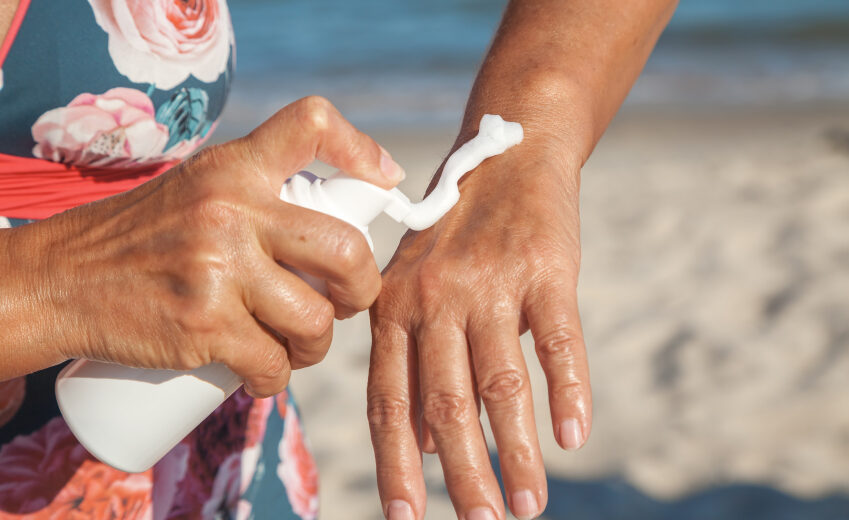Why is Sun Protection So Important?

 By Susan Lakey, PharmD, MPH, BCPP
By Susan Lakey, PharmD, MPH, BCPP
UW Pharmacy Cares Consultant Pharmacist
It’s summertime! While The Pacific Northwest may not be all sunshine all the time, you’ll still need to consider sun safety every time you wander outdoors during these warmer months.
Why is Sun Protection Important?
As we age, our skin becomes more thin and fragile. Years of cumulative sun exposure add to these natural aging effects, leading to skin that is more susceptible to the sun’s rays, and less able to repair damage that occurs.
In addition, aging skin produces less sweat, which makes it harder to cool the body. As a result, you have a higher risk for overheating and sunstroke.
It doesn’t take much sun to cause skin damage. Sunscreens can help protect your skin, reduce your risk for skin cancer, and reduce further damage from occurring.
Protecting Your Skin — The Three “S’s”
There are three key ways to shield your skin from the sun’s damaging rays — sun avoidance, sun-protective clothing, and sunscreen.
Sun avoidance
Staying completely out of the sun is one obvious way to protect your skin from sun exposure. But who wants to remain indoors all summer long? Not to mention, the sun provides important health benefits — like a brighter mood. Your best bet? Limit direct sun exposure during peak sun hours, generally considered to be between 10 am and 4 pm. When you are outdoors, look for shady spots.
Sun-Protective Clothing
Cover exposed areas of your skin with protective clothing, such as hats, lightweight long sleeve shirts, and long pants. Tightly woven fabrics provide more protection than loose ones. Also, keep in mind that clothing is used in combination with sunscreen, not instead of it.
Sunscreen
Use it any time you’ll be venturing outside. Overwhelmed by all the sunscreen choices? A little sunscreen knowledge may help.
First, all sunscreens are labeled with a “sun protection factor” (SPF). This number describes how effective the sunscreen is at preventing sun damage caused by UVB rays. If you normally begin to burn after 10 minutes in the sun, a sunscreen with an SPF of 15 would give you 15 times that protection — so, you would begin to burn after 150 minutes in the sun with the sunscreen.
However, it’s not really that straightforward, since many factors play a role in how well your skin is protected from the sun. In addition, your sunscreen will wash off well before 150 minutes.
Second, the higher the SPF, the greater the protection against UVB radiation…to a point. An SPF 15 sunscreen filters out about 93 percent of UVB radiation, SPF 30 about 97 percent, and SPF 50 about 98 percent. Any additional benefit above SPF 50 is negligible.
Third, you’ll want a broad-spectrum sunscreen, which provides protection against both UVA and UVB radiation. This shouldn’t be a problem, though, since all sunscreens are required to block UVA and UVB as of December 2012.
Finally, most sources will recommend choosing a PABA-free sunscreen (PABA stands for Para-Aminobenzoic Acid) since PABA can trigger allergic reactions in many people. This is good advice, but know that PABA is rarely used anymore.
Here are some bottom-line tips for effective sunscreen use:
- Choose one with an SPF of at least 15, preferably 30.
- Apply the sunscreen generously, beginning 15 to 30 minutes before you’ll be out in the sun.
- Reapply your sunscreen at least every two hours, more often if you’re in the water.
- If you have dry skin, choose a sunscreen with added moisturizer.
Other sun protection tips:
Don’t forget to apply sunscreen in often overlooked areas, such as the tops of your ears and your scalp (especially if you have thin or no hair).
Protect your lips with a lip balm that contains sunscreen.
Drink plenty of water to stay hydrated.
Remember that the sun can damage the eyes as well. Wear wraparound sunglasses for protection.
A Brief Note About Vitamin D
As you probably know, your body relies on sun exposure to make vitamin D, which is notably important for supporting bone health. At this time, it isn’t entirely clear whether sunscreen use interferes with the body’s ability to make vitamin D. General sunscreen use may not; however, applying thick layers may. That said, given the importance of protecting your skin against sun damage, it’s probably best to take oral vitamin D supplements instead of skipping the sunscreen, especially if you apply large amounts of sunscreen often.
Enjoy the sun!
References available upon request at UW Pharmacy Cares.
UW Pharmacy Cares is a non-dispensing pharmacy at the UW School of Pharmacy that offers education and support to those taking multiple medicines. We have partnered with Era Living’s retirement communities, offering their residents services that promote the safe and healthy use of medicines.
Related Posts

Top of Mind Questions for Seniors When Moving to a Retirement Community

Personal Growth & Finding the Support to Build New Habits

